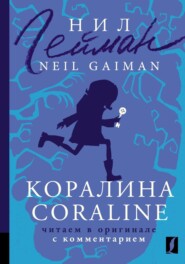По всем вопросам обращайтесь на: info@litportal.ru
(©) 2003-2024.
✖
Коралина / Coraline
Настройки чтения
Размер шрифта
Высота строк
Поля
“Then explore the flat,” suggested her father. “Look—here's a piece of paper and a pen. Count all the doors and windows. List everything blue. Mount an expedition to discover the hot water tank. And leave me alone to work.”
“Can I go into the drawing room?” The drawing room was where the Joneses kept the expensive (and uncomfortable) furniture Coraline's grandmother had left them when she died. Coraline wasn't allowed in there. Nobody went in there. It was only for best.
“If you don't make a mess. And you don't touch anything.”
Coraline considered this carefully, then she took the paper and pen and went off to explore the inside of the flat.
She discovered the hot water tank (it was in a cupboard in the kitchen).
She counted everything blue (153).
She counted the windows (21).
She counted the doors (14).
Of the doors that she found, thirteen opened and closed. The other—the big, carved, brown wooden door at the far corner of the drawing room—was locked.
She said to her mother, “Where does that door go?”
“Nowhere, dear.”
“It has to go somewhere.”
Her mother shook her head. “Look,” she told Coraline.
She reached up and took a string of keys from the top of the kitchen doorframe. She sorted through them carefully, and selected the oldest, biggest, blackest, rustiest key. They went into the drawing room. She unlocked the door with the key.
The door swung open.
Her mother was right. The door didn't go anywhere. It opened onto a brick wall.
“When this place was just one house,” said Coraline's mother, “that door went somewhere. When they turned the house into flats, they simply bricked it up. The other side is the empty flat on the other side of the house, the one that's still for sale.”
She shut the door and put the string of keys back on top of the kitchen doorframe.
“You didn't lock it,” said Coraline.
Her mother shrugged. “Why should I lock it?” she asked. “It doesn't go anywhere.”
Coraline didn't say anything.
It was nearly dark outside now, and the rain was still coming down, pattering against the windows and blurring the lights of the cars in the street outside.
Coraline's father stopped working and made them all dinner.
Coraline was disgusted. “Daddy,” she said, “you've made a recipe again.”
“It's leek and potato stew with a tarragon garnish and melted Gruyère cheese,” he admitted.
Coraline sighed. Then she went to the freezer and got out some microwave chips and a microwave minipizza.
“You know I don't like recipes,” she told her father, while her dinner went around and around and the little red numbers on the microwave oven counted down to zero.
“If you tried it, maybe you'd like it,” said Coraline's father, but she shook her head.
That night, Coraline lay awake in her bed. The rain had stopped, and she was almost asleep when something went t-t-t-t-t-t. She sat up in bed.
Something went kreeee…
…aaaak
Coraline got out of bed and looked down the hall, but saw nothing strange. She walked down the hall. From her parents' bedroom came a low snoring—that was her father—and an occasional sleeping mutter—that was her mother.
Coraline wondered if she'd dreamed it, whatever it was.
Something moved.
It was little more than a shadow, and it scuttled down the darkened hall fast, like a little patch of night.
She hoped it wasn't a spider. Spiders made Coraline intensely uncomfortable.
The black shape went into the drawing room, and Coraline followed it a little nervously.
The room was dark. The only light came from the hall, and Coraline, who was standing in the doorway, cast a huge and distorted shadow onto the drawing room carpet—she looked like a thin giant woman.
Coraline was just wondering whether or not she ought to turn on the lights when she saw the black shape edge slowly out from beneath the sofa. It paused, and then dashed silently across the carpet toward the farthest corner of the room.
There was no furniture in that corner of the room.
Coraline turned on the light.
There was nothing in the corner. Nothing but the old door that opened onto the brick wall.
She was sure that her mother had shut the door, but now it was ever so slightly open. Just a crack. Coraline went over to it and looked in. There was nothing there—just a wall, built of red bricks.
Coraline closed the old wooden door, turned out the light, and went to bed.
She dreamed of black shapes that slid from place to place, avoiding the light, until they were all gathered together under the moon. Little black shapes with little red eyes and sharp yellow teeth.
They started to sing,
We are small but we are many
We are many we are small
We were here before you rose
We will be here when you fall.
Their voices were high and whispering and slightly whiney. They made Coraline feel uncomfortable.
Then Coraline dreamed a few commercials, and after that she dreamed of nothing at all.
“Can I go into the drawing room?” The drawing room was where the Joneses kept the expensive (and uncomfortable) furniture Coraline's grandmother had left them when she died. Coraline wasn't allowed in there. Nobody went in there. It was only for best.
“If you don't make a mess. And you don't touch anything.”
Coraline considered this carefully, then she took the paper and pen and went off to explore the inside of the flat.
She discovered the hot water tank (it was in a cupboard in the kitchen).
She counted everything blue (153).
She counted the windows (21).
She counted the doors (14).
Of the doors that she found, thirteen opened and closed. The other—the big, carved, brown wooden door at the far corner of the drawing room—was locked.
She said to her mother, “Where does that door go?”
“Nowhere, dear.”
“It has to go somewhere.”
Her mother shook her head. “Look,” she told Coraline.
She reached up and took a string of keys from the top of the kitchen doorframe. She sorted through them carefully, and selected the oldest, biggest, blackest, rustiest key. They went into the drawing room. She unlocked the door with the key.
The door swung open.
Her mother was right. The door didn't go anywhere. It opened onto a brick wall.
“When this place was just one house,” said Coraline's mother, “that door went somewhere. When they turned the house into flats, they simply bricked it up. The other side is the empty flat on the other side of the house, the one that's still for sale.”
She shut the door and put the string of keys back on top of the kitchen doorframe.
“You didn't lock it,” said Coraline.
Her mother shrugged. “Why should I lock it?” she asked. “It doesn't go anywhere.”
Coraline didn't say anything.
It was nearly dark outside now, and the rain was still coming down, pattering against the windows and blurring the lights of the cars in the street outside.
Coraline's father stopped working and made them all dinner.
Coraline was disgusted. “Daddy,” she said, “you've made a recipe again.”
“It's leek and potato stew with a tarragon garnish and melted Gruyère cheese,” he admitted.
Coraline sighed. Then she went to the freezer and got out some microwave chips and a microwave minipizza.
“You know I don't like recipes,” she told her father, while her dinner went around and around and the little red numbers on the microwave oven counted down to zero.
“If you tried it, maybe you'd like it,” said Coraline's father, but she shook her head.
That night, Coraline lay awake in her bed. The rain had stopped, and she was almost asleep when something went t-t-t-t-t-t. She sat up in bed.
Something went kreeee…
…aaaak
Coraline got out of bed and looked down the hall, but saw nothing strange. She walked down the hall. From her parents' bedroom came a low snoring—that was her father—and an occasional sleeping mutter—that was her mother.
Coraline wondered if she'd dreamed it, whatever it was.
Something moved.
It was little more than a shadow, and it scuttled down the darkened hall fast, like a little patch of night.
She hoped it wasn't a spider. Spiders made Coraline intensely uncomfortable.
The black shape went into the drawing room, and Coraline followed it a little nervously.
The room was dark. The only light came from the hall, and Coraline, who was standing in the doorway, cast a huge and distorted shadow onto the drawing room carpet—she looked like a thin giant woman.
Coraline was just wondering whether or not she ought to turn on the lights when she saw the black shape edge slowly out from beneath the sofa. It paused, and then dashed silently across the carpet toward the farthest corner of the room.
There was no furniture in that corner of the room.
Coraline turned on the light.
There was nothing in the corner. Nothing but the old door that opened onto the brick wall.
She was sure that her mother had shut the door, but now it was ever so slightly open. Just a crack. Coraline went over to it and looked in. There was nothing there—just a wall, built of red bricks.
Coraline closed the old wooden door, turned out the light, and went to bed.
She dreamed of black shapes that slid from place to place, avoiding the light, until they were all gathered together under the moon. Little black shapes with little red eyes and sharp yellow teeth.
They started to sing,
We are small but we are many
We are many we are small
We were here before you rose
We will be here when you fall.
Their voices were high and whispering and slightly whiney. They made Coraline feel uncomfortable.
Then Coraline dreamed a few commercials, and after that she dreamed of nothing at all.

















